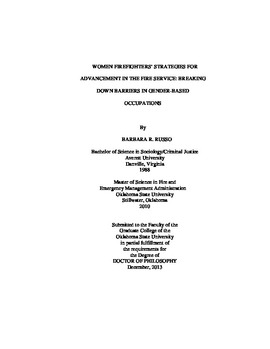| dc.contributor.advisor | Neal, Dave M. | |
| dc.contributor.author | Russo, Barbara Rose | |
| dc.date.accessioned | 2015-06-17T20:07:47Z | |
| dc.date.available | 2015-06-17T20:07:47Z | |
| dc.date.issued | 2013-12 | |
| dc.identifier.uri | https://hdl.handle.net/11244/15098 | |
| dc.description.abstract | This dissertation examines the barriers female firefighters face trying to advance through the ranks and the strategies they use to overcome these barriers. Despite the fact that women have been employed as career firefighters for nearly 40 years, their numbers have not reflected much growth or mobility through the ranks over this time period. The extant literature primarily focuses on issues faced by women attempting to enter the fire service, not what prevents them from advancing once they enter it. The study asks female firefighters to identify perceived obstacles to their advancement through the ranks and the strategies used to advance. A quantitative methods approach was taken for the dissertation. A survey was distributed online through the International Association of Women in Fire and Emergency Services over a period of one month (June 2013) and 224 female fire service members responded to the survey. Data from the survey, which included several open-ended questions, revealed several distinct perceived barriers to advancement. The data revealed findings related to: (1) mobility through the ranks, (2) perceived barriers to advancement, (3) strategies used to overcome these barriers, (4) educational practices of women in the fire service, and (5) the significant impact of organizational culture within the fire service. Multiple linear regression analysis demonstrated a statistically significant model determining that sexual harassment experience, coupled with total sexual discrimination experience and glass barrier variables predicted the number of promotions received in the current department. From a theoretical standpoint, the study confirmed that a glass ceiling does exist for women at the company officer (captain) level. It also identified how powerful organizational culture can be by providing one group with advantages while alienating others. It may come in the form of denied training requests, assignment to stations where limited experience can be gained, and denial of assignment to specialty teams - all of which may allow men to advance at faster rates than women. From a practical standpoint, the study offers insight into organizational culture and practices within the fire service that must be addressed by fire service leaders if diversity is ever to be truly achieved. | |
| dc.format | application/pdf | |
| dc.language | en_US | |
| dc.rights | Copyright is held by the author who has granted the Oklahoma State University Library the non-exclusive right to share this material in its institutional repository. Contact Digital Library Services at lib-dls@okstate.edu or 405-744-9161 for the permission policy on the use, reproduction or distribution of this material. | |
| dc.title | Women firefighters' strategies for advancement in the fire service: Breaking down barriers in gender-based occupations | |
| dc.contributor.committeeMember | Phillips, Brenda D. | |
| dc.contributor.committeeMember | Mendez, Jeanette Morehouse | |
| dc.contributor.committeeMember | Mix, Tamara L. | |
| osu.filename | Russo_okstate_0664D_13030.pdf | |
| osu.accesstype | Open Access | |
| dc.type.genre | Dissertation | |
| dc.type.material | Text | |
| dc.subject.keywords | female | |
| dc.subject.keywords | firefighters | |
| dc.subject.keywords | gender | |
| dc.subject.keywords | glass ceiling | |
| dc.subject.keywords | promotions | |
| dc.subject.keywords | ranks | |
| thesis.degree.discipline | Fire and Emergency Management Administration | |
| thesis.degree.grantor | Oklahoma State University | |
